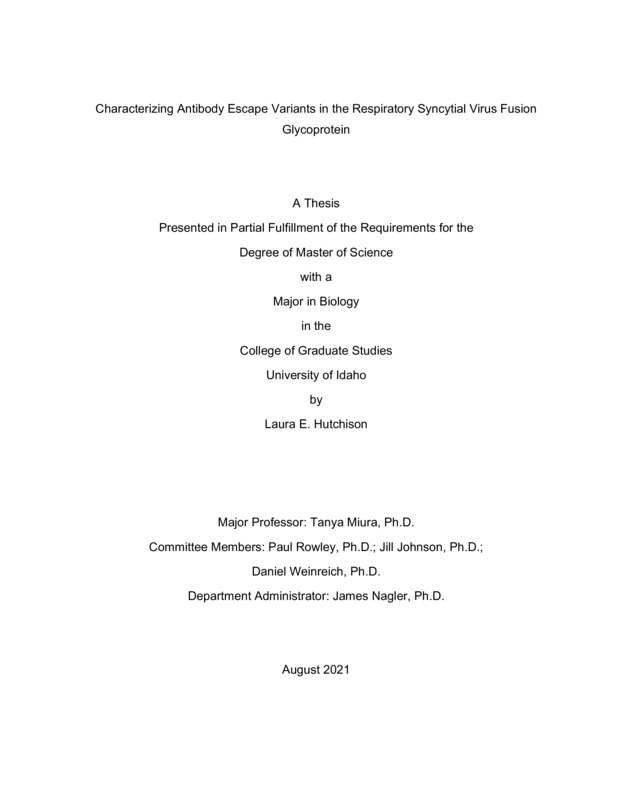Characterizing Antibody Escape Variants in the Respiratory Syncytial Virus Fusion Glycoprotein
Hutchison, Laura Elizabeth. (2021-08). Characterizing Antibody Escape Variants in the Respiratory Syncytial Virus Fusion Glycoprotein. Theses and Dissertations Collection, University of Idaho Library Digital Collections. https://www.lib.uidaho.edu/digital/etd/items/hutchison_idaho_0089n_12153.html
- Title:
- Characterizing Antibody Escape Variants in the Respiratory Syncytial Virus Fusion Glycoprotein
- Author:
- Hutchison, Laura Elizabeth
- Date:
- 2021-08
- Keywords:
- Antibody escape D25 Deep mutational scanning Fusion glycoprotein Respiratory Syncytial Virus
- Program:
- Biology
- Subject Category:
- Virology; Molecular biology; Biochemistry
- Abstract:
-
Monoclonal antibodies (mAbs) are becoming more commonly used as prophylactics or therapeutics for viral infections. While the binding specificity of the mAb may provide adequate protection against the wild-type virus, natural selection will favor viral genomes that acquire mutations leading to amino acid changes in viral proteins where mAbs normally bind. This results in a phenomenon known as antibody escape. This thesis project focuses on the mAb D25 and its interaction with the respiratory syncytial virus (RSV) fusion glycoprotein (F). F mediates viral entry into host cells and fusion between neighboring cells, while D25 neutralizes the ability of F to function in entry kinetics. However, F readily mutates to evade the neutralizing effects of mAbs including D25, resulting in variants that lead to antibody escape. A D25 mutational library encompassing 30 sites within the D25 binding epitope of F was built with the help of molecular modeling. We developed a high-throughput pipeline to screen these variants for antibody escape using methodologies such as deep mutational scanning and retroviral gene expression systems. Several individual variants within the D25 library were also assessed for antibody binding differences using flow cytometry and in-cell ELISA. Along with molecular modeling predictions of F mutations that give rise to antibody escape, our lab previously identified three mutations via deep sequencing after several passages of RSV in HEp-2 cells with varying concentrations of the D25 mAb. These mutations, Q202R, N208Y, and N208K were identified, where N208Y and N208K were both predicted by molecular modeling. This project allows for the identification and characterization of potential escape mutations in F by screening all potential amino acid variants at the 30 sites within the D25 binding epitope. We can use our findings to assist in viral variant surveillance for RSV, first using a broad deep mutational scanning – based screen to find potential escape mutants and then by validating those findings using individual-based binding assays.
- Description:
- masters, M.S., Biology -- University of Idaho - College of Graduate Studies, 2021-08
- Major Professor:
- Miura, Tanya
- Committee:
- Rowley, Paul; Johnson, Jill; Weinreich, Daniel
- Defense Date:
- 2021-08
- Identifier:
- Hutchison_idaho_0089N_12153
- Type:
- Text
- Format Original:
- Format:
- application/pdf
- Rights:
- In Copyright - Educational Use Permitted. For more information, please contact University of Idaho Library Special Collections and Archives Department at libspec@uidaho.edu.
- Standardized Rights:
- http://rightsstatements.org/vocab/InC-EDU/1.0/

